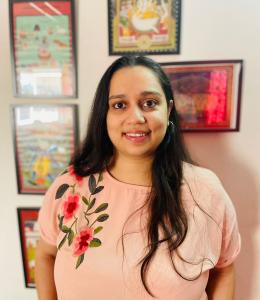
Dr Sonia Wigh
Postdoctoral Fellow, December 2021 - January 2022
Home Institution: University of Exeter
Sonia Wigh recently received her doctorate from the Department of History, University of Exeter. She was awarded the College of Humanities International studentship for pursuing her project titled ‘The Body of Words: A Social History of Sex and the Body in Early Modern South Asia’, under the co-supervision of Dr. Nandini Chatterjee and Dr. Sarah Toulalan. Her research focused on the history of sexuality, medicine, and body in early modern South Asia. She pursued her M.Phil. dissertation on ‘Patronage, Power and Sexuality: A Study of the Language of Biharilal and Mir Jafar Zatalli’ at the Centre for Historical Studies, Jawaharlal Nehru University, New Delhi. While at Exeter, she taught the FLC Hindi/Urdu course. She has previously taught at Hindu College, University of Delhi. Her published works include ‘Politics, Patronage, Polyvalence: Mirza Raja Jai Singh in Biharilal's Satsai’ in Social Scientist, Vol.43 (Nos. 5-6), May-June 2015 and ' Sex and the Sakhi: Femininity in Bihari’s Satsai’ in Proceedings of the Indian History Congress (75th Session: New Delhi, 2014), Aligarh, 2015. She has occupied key editorial positions in Ex-Historia (PGR run journal at Exeter) and Studies in History (Sage Publications). Her current interest includes issues of multilingualism, body in art, and the art of translation.
Project Title: Pleasure in a Jar: Personal Care Pharmacology in Early Modern South Asia
My project will focus on personal care pharmacology, ranging from removing body odour, to ‘cosmetics’ that enhanced physical features, to ‘altering’ genitalia in a bid to make an individual more desirable, as well as to enhance pleasure during intimate encounters. These prescriptions were addressed to men and women both, intrinsic in the making of early modern ‘masculinity’ and ‘femininity’. These prescriptions featured heavily in early modern eroto-medical manuals like Laẕẕat al-nisā’ (Pleasures of/from women), Asrar al-nisā’ (Secrets of women), and Kokamañjarī (Garlands of Kokā). By contextualizing these manuals, with information in eighteenth-century medical (ṭibbī) treatises, we can make an argument towards changes wrought by transformations within the South Asian subcontinent when Indo-Islamicate medical knowledge producers translated and commented upon ‘western’ medical traditions. Do these encounters have a practical impact on ingredients, recipes, and prescriptions? How were these similarities and differences articulated? What items were ‘introduced’ to the pre-existing pharmacological paradigms? Was there an alteration in understanding the ‘temperament’ of an ingredient? Concomitantly, what were the effects of these transformed understandings of pharmacology in medical prescriptions and curative practices? Lastly, this project will survey various consumables that could stimulate good health, beauty, and lust, as well as enhance the potential of an individual to attract their partners during intimate moments.
